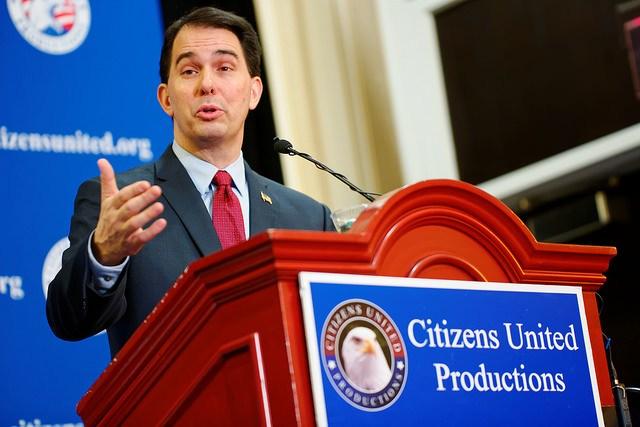
Our democratic system of government was established to balance the competition between self-interest and the concerns of the greater good. Since the earliest days, those who gained economic power, be it individuals or corporations, have often tried to use that power to bend the system and its rules to their liking. Sometimes they succeeded, usually by using their wealth to influence the political election process. In the 229 years since our nation’s birth, the problem is as bad today as it has ever been.
A recent story in the Guardian based on leaked court documents illustrates this perfectly. It focuses on an investigation of alleged “criminal campaign-finance violations by the campaign committee of Scott Walker," Wisconsin governor and former Republican presidential candidate.
What’s interesting about this case is that the state’s supreme court not only halted the investigation in July 2015, calling the defendants “wholly innocent of any wrongdoing,” but it also ordered all records regarding the matter be destroyed. But one set of documents, some 1,500 pages, survived and were obtained by the Guardian.
By 2011 Walker, working with a hard conservative legislature, managed to successfully strip public worker unions of their collective bargaining rights. He had become a poster boy for conservatives and a lightning rod for progressives. Outrage at this action spread quickly across the nation and some 100,000 protestors assembled in front of the state capitol to register their disapproval. Subject to a recall election, he personally reached out to wealthy right-wing business leaders -- including Donald Trump, who poured cash into a “dark money” group called the Wisconsin Club for Growth (WCfG). Since WCfG was registered as a nonprofit, it was not required to disclose any details about the contributions it received. That also meant contributions given in this manner were not subject to the legal limits that apply to contributions made directly to candidates.
With the $12 million that he received in this manner, and a great deal more from other sources, Walker launched an all-out media blitz, including “a mass of micro-targeted mail-outs and TV advertising,” and won the election in Wisconsin, reports Ed Pilkington of the Guardian. Some of those funds also went to help conservative state legislators that had also been recalled. Ultimately four of the six recalled senators kept their seats, enough to retain a Republican majority by one vote. All told, Republicans outspent Democrats in the campaign by $58.7 million to $21.9 million.
Sadly, this is how things get done in American politics today. But the question remains: Was it legal?
That’s what the investigation sought to find out. Wisconsin law explicitly states that corporations are not allowed to make political contributions. They are allowed to give to advocacy groups but only if those groups are independent of any candidate. Details revealed a pattern in which Walker personally met with these tycoons (15 are listed here). Then, within a week or two, a large check would arrive for WCfG.
From the viewpoint of Wisconsin’s judicial system, these accusations of illegal activity were little more than “tyrannical retribution of arbitrary or capricious governmental prosecution,” Pilkington wrote last week.
But a number of campaign-finance monitoring groups, such as the Center for Media and Democracy and the Brennan Center and Common Cause, have questioned the impartiality of the Wisconsin court and asked the U.S. Supreme Court to weigh in on the matter.
Certainly, it’s unusual for a court to order all records pertaining to a criminal investigation be destroyed. In fact, the court later revised that order, asking that the documents be placed under seal. But the fact that they even considered doing such a thing should raise a flag.
Indeed, one of the state supreme court judges, David Prosser, was up for re-election at the same time as the recall election. Walker’s team was very concerned about preserving a conservative majority on the court. And emails revealed in the probe show members of Walker’s team acknowledging that WCfG “is leading the coalition to maintain the court.”
So we have a judge ruling to halt an investigation into a group that is working to help re-elect him. Mightn’t there be a slight conflict of interest there? Prosser was asked to recuse himself from ruling on the investigation, but he refused. In the end, some $3.5 million was spent on re-electing Prosser, an unheard-of amount for a judge. Typically judges fund their own modest campaigns themselves, and are limited by law to a cap of $400,000.
At a time when concerns over money in politics has reached a fever pitch on both sides, with a growing movement to overturn the Citizens United decision which clearly opened these flood gates, it will certainly be interesting to see what the Supreme Court has to say about what happened in Wisconsin.
Image credit: Michael Vadon: Flickr Creative Commons

RP Siegel (1952-2021), was an author and inventor who shined a powerful light on numerous environmental and technological topics. His work appeared in TriplePundit, GreenBiz, Justmeans, CSRWire, Sustainable Brands, Grist, Strategy+Business, Mechanical Engineering, Design News, PolicyInnovations, Social Earth, Environmental Science, 3BL Media, ThomasNet, Huffington Post, Eniday, and engineering.com among others . He was the co-author, with Roger Saillant, of Vapor Trails, an adventure novel that shows climate change from a human perspective. RP was a professional engineer - a prolific inventor with 53 patents and President of Rain Mountain LLC a an independent product development group. RP was the winner of the 2015 Abu Dhabi Sustainability Week blogging competition. RP passed away on September 30, 2021. We here at TriplePundit will always be grateful for his insight, wit and hard work.














